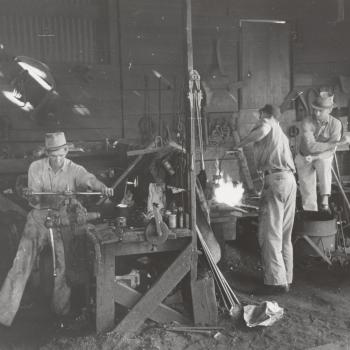Pope Gregory XVI (1765-1846) opposed gas street lamps and railroad engines. Although these examples are silly today, Catholicism’s cautious stance toward modern advancements had some merit.
For example, our modern notion of individual liberty is a monumental achievement of modern thinking. But Gregory XVI was well aware of the downside. The French Revolution (1789-1799), waged under the banner of liberty, was accompanied by Reign of Terror. It involved over 16,000 executions, including many clergy and religious. Property was confiscated; Catholic monasteries were closed.
Is it productive and theologically sound for Catholicism to wail against modern discoveries or trends, one after another? For a time the answer seemed to be a qualified yes. However, official Catholic posture toward the world was to take a major turn during the pontificate of St. John XXIII (1881-1963). He and other forward-looking leaders associated with Vatican II (1962-1965) put away censures and rebukes against the modern world. They no longer used phrases like “the advance of error” and “the evils of the age.”
John XXIII “was not unaware of the evils, or the errors, or the apostasy, or the deadly danger” within modern times, writes British historian E.E.Y. Hales (1908-1986). “But he was more impressed by the opportunities, by the improvements, and by the many causes for encouragement, and he preferred to give his attention to these.” Without buying into all modern beliefs and practices, John XXIII “accepted and welcomed the modern world as a working partnership.”
Here’s an example of John XXIII’s turn in church strategy. Nikita Khrushchev (1894-1971), the secretary of the Communist Party and leader of the Soviet Union, conducted a dialogue with John XXIII through 1962 and 1963. Several Church officials criticized the pope for selling-out the true faith to communism, a modern philosophy of materialism. But John XXIII replied: It is “not necessary to be in philosophical agreement with people in order to cooperate with them.” John XXIII, explains Hales, “raised the fundamental question whether a political party’s professed philosophy really mattered very much. The fact that a movement derived from false principles…did not mean that it was incapable of some good.”
The relationship between John XXIII and Khrushchev paid off during the Cuban Missile Crisis of October 1962. Both Khrushchev and President John Kennedy (1917-1963) wanted a resolution that showed steadfastness to their own people yet allowed for compromise. Each needed some cover. Khrushchev, knowing of Kennedy’s Catholicism, invoked John XXIII’s calls for peace, implying that a good Catholic would not disappoint the pope. Along with other strategies used on both sides, the papal connection helped prevent the closest the world has come to its complete destruction.
Why today do many people have the impression that Catholicism is reactionary; that to be a Catholic is to oppose the modern world?
It is perhaps because people, including many Catholics, are not fully informed. They are selective in what they attribute to Catholicism. They perhaps fail to appreciate the enormous investment that Catholics and Catholic institutions make in science, medicine, research, communications, diplomacy, and in environmental causes, anti-poverty efforts and more.
It is also perhaps because modern people, including many Catholics, expect Catholicism to completely and uncritically embrace all modern ideas. They don’t, for example, realize that Catholicism’s opposition to abortion is part of its opposition to the modern pseudo-science of eugenics. In their regard for individualism (on abortion and many other issues) many modern people don’t hear Catholicism’s warning that free choice partners with free responsibility without which individual liberty becomes destructive libertarianism. Thus many people presume that their individual right includes vaccine refusal and then disregard for other public health measures.
It is perhaps because many Catholic leaders are weak and afraid. They equivocate on matters of gender and sexuality, for example. Even though they know that truth emerges in modern societies only through respectful dialogue, many Catholic leaders revert to counter-productive scolding or moralizing. These are the Catholic leaders whom John XXIII called “prophets of gloom.”
Perhaps, similarly, it is because some Catholic leaders, aware of the moral bankruptcy following from financial scandals in churches and from cover-ups of deviant personnel, take short cuts: dragging out fringe topics expressed righteously in a stale language of prohibitions.
John XXIII’s feast day is Monday, October 11, 2021. There are several good biographies, including The Vision of Saint John XXIII by Randall Rosenberg (Paulist Press, 2014) and The Good Pope by Greg Tobin (Harper Collins, 2012).
Droel is associated with National Center for the Laity (PO Box 291102, Chicago, IL 60629).










